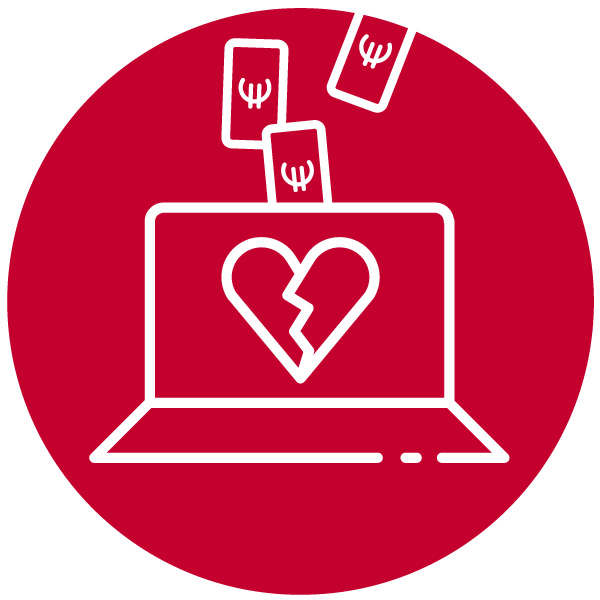
On the occasion of Valentine's Day, the European Consumer Centre in Spain (ECC-Spain) warns that - with the rise of social media and dating apps - new misleading practices and online scams are appearing, involving the use of false images and information with which cybercriminals build idealised profiles to deceive and emotionally manipulate, and even steal from others. This is known as catfishing; a technique that often has devastating emotional and financial consequences for those who fall for it. In addition, scammers may pressure their victims to obtain intimate images. They will then use these compromising images for blackmail (sextortion), and may even take advantage of the personal information shared to impersonate the victim.
To do this, criminals often organise and plan their actions to gain the trust of their victims and take advantage of them. Once the fake online profile has been created, they start to create a link strong enough to influence the decisions of the person concerned. In general, these are the steps they usually follow:
1. Creation of a false identity. Fictitious profile on social media and/or dating platforms with stolen photographs and personal data to give more credibility. Too perfect profiles, with few posts or recent activity, with few friends or followers, lacking authentic interactions.
2. First contact. Sending private messages or friend requests.
3. Building the emotional relationship. Frequent online conversations and false personal details. Cybercriminals often offer constant excuses to show themselves in person or on camera.
4. Emotional manipulation. They make up touching stories to build empathy and trust. Stories often change or have details that do not fit well. Questions are often not answered clearly. They seek to create a quick and disproportionate emotional attachment and commitment through excessive flattery, romantic messages and promises of an idealised future.
5. Requests for money or favours. Help, usually financial, is requested for medical emergencies, debts or sudden desperate situations. They may request intimate content or conversations that will later be used to blackmail the victim (sextortion).
Recommendations from ECC-Spain to protect yourself from catfishing:
1. Protect personal information. Do not share private data with people you only know online. Do not share intimate content with anyone.
2. Check suspicious profiles. Perform reverse image searches to check if the photos used in the profile have been stolen. Verify the information provided in the profile. Look for inconsistencies.
3. Set up privacy settings on social networks. Limit information visible to strangers to reduce the risk that they can collect information and build a profile with your data in order to perform a scam.
4. Avoid rushing and soliciting money. Do not send money without first investigating the situation thoroughly.
5. Report suspicious profiles. Platforms have functions to report fake profiles or scams.
However, if you have nevertheless been a victim of catfishing, the European Consumer Centre recommends acting quickly to protect your personal information. To do so, it is important to gather as much evidence as possible, such as screenshots and conversations that can support the case. In addition, it is advisable to file a complaint with the security authorities. On the other hand, check if there is personal information about you on the Internet and how it could be being used. In case you want to remove this information, you can exercise your right to be forgotten so that search engines and websites can delete it.
On the other hand, it should be noted that, in Spain, services with digital elements, such as online dating sites, are also covered by a 2-year guarantee. Thus, when, for example, the service of the dating site does not work properly, the personal account cannot be accessed or the chat service is not provided normally; users will have the right to claim the repair of the service, a discount or to terminate the contract. In addition, current legislation also considers contracts for the provision of digital content or services to be those in which, in exchange for the provision of the consumer's personal data, a service is received or digital content is accessed.